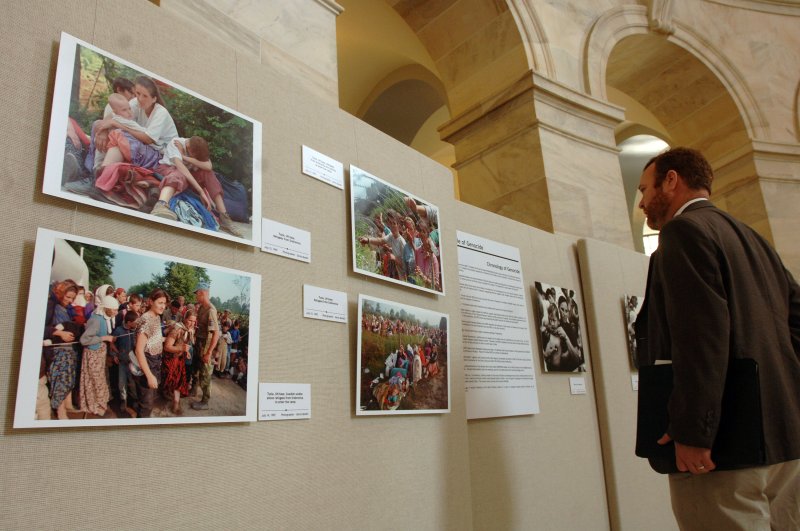The photo exhibit "Srebrenica, remembrance for the future," was on display in the Russell Senate Office Building in Washington in 2005. An appeals court in The Hague upheld a civil complaint on Tuesday, charging Dutch troops, working as United Nations peacekeepers in the war, partially liable for the deaths of about 300 Muslim Serbs. UPI File Photo |
License Photo
June 27 (UPI) -- The Netherlands is partially responsible for the deaths of 300 Muslims killed in the Bosnian War's Srebrenica massacre in 1995, a court in The Hague ruled Tuesday.
The Hague Court of Appeals upheld much of a civil court judgement in 2014. The judgement found that Dutch troops, working as U.N. peacekeepers, turned Bosnian Muslim men over to Bosnian Serb troops. The Muslims were among about 8,000 people killed in a campaign of genocide during the massacre.
The court ruling Tuesday said the Dutch peacekeepers should have been aware the Muslim men were seeking refuge at the U.N. base near Srebrenica in Potocari, Bosnia and Herzegovina, and that they would be killed by Bosnian Serb troops if forced to leave. As Bosnian Serb troops descended on Srebrenica, about 10,000 people fled, and were slaughtered. The number included those abducted after the Dutch peacekeepers turned them over to Bosnian Serb forces.
Because they were expelled from the place of refuge, "they were deprived of the chance of survival," Judge Gepke Dulek said.
The verdict is the first time a country has been held liable for its military force's actions while acting under a U.N. mandate. The judges ruled that surviving relatives of victims will be entitled to compensation to be established at a later date.
The International Criminal Tribunal for the former Yugoslavia regards the killings at Srebrenica and expulsion of Bosnian civilians as genocide. It principally blamed the officers of the Bosnian Serb army. A U.N. criminal tribunal indicted 20 people for their involvement; one, Bosnian Serb army leader Ratko Mladic, was captured in 2011 and is on trial for crimes against humanity and genocide.















